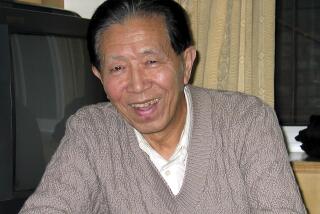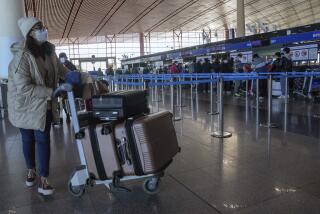SARS Lays Bare a Contradiction
- Share via
BOSTON — In its 54th year, the Chinese Communist regime displays both success and vulnerability, and the unsettling arrival of severe acute respiratory syndrome intersects with each.
Battered by the Tiananmen Square tragedy in 1989 and stunned by the collapse of the Soviet Union in 1991, Beijing sought to save Leninism with consumerism. This has worked.
But China still lacks elected leadership and a free press. The top Chinese figure is heir both to Leninism and Chinese dynastic rule. The citizens of the People’s Republic of China are kept in the dark on sensitive topics. They are trusted with their money, but not with their minds.
Mao Tse-tung offered his people neither money nor information. In 1976, Mao’s last year, an earthquake struck Tangshan, a city east of Beijing. Scientists around the globe knew it was huge. But Beijing hid the truth, refusing offers of assistance from the U.S. and the United Nations, though China needed help. Only years later did the government reveal that the quake had killed more than 240,000 people.
How many of the bodies dragged from the Tangshan rubble would have been kept alive if Beijing had put saving lives above saving face? The posture of silence and denial bespoke an imperial state. For the Chinese emperors, an earthquake, flood, famine, epidemic -- even a falling meteor -- was best left unmentioned because many Chinese believed they portended dynastic decline. Mao, himself a neo-emperor, linked cosmology and politics, despite his communist principles. That was one reason why Beijing drew a veil over the Tangshan earthquake.
A decade and a half after Mao’s death, tipped off by a terrified Chinese gay man, I found my way to an unpublicized exhibition on AIDS in a gray-walled building near Tiananmen Square. There were photos and cartoons of dirty Western bathrooms, promiscuous U.S. soldiers, gays frolicking in San Francisco. The captions said Western bourgeois society had spawned a terrible new disease.
A few years later, AIDS became a major problem in China, not in Shanghai and Beijing where “decadent” Western tourists bedded “innocent” Chinese youths, but in the poppy-growing country of southwest China near the Myanmar border. Blood-selling in rural China made the drug-related AIDS problem worse. At first, Beijing told the world China had no AIDS cases at all.
Telling lies can threaten “stability and unity,” just as reporting bad news can. Without doubt, however, transparency about SARS does risk panic among a jumpy populace.
Initially, after SARS burst out last November in southern Guangdong province, Beijing’s response was similar to its handling of AIDS: Give little news, blame non-Chinese when possible, understate the cases.
For months, the Chinese party-state did not report the puzzling respiratory illness to the World Health Organization or its own medical chiefs across the country. Highly infectious, the virus jumped from south China to Hong Kong. Before the WHO wrenched details from Beijing, it had spread to a dozen countries (with deaths climbing). Today, SARS is in 27 countries. At least 417 people are dead, half of them in China, and an estimated 6,000 are infected.
In the medically crucial early months, Chinese journalists were told not to write about SARS. When, terribly late, a WHO team began work in China, it was not permitted to travel to Guangdong. The WHO was given false statistics about cases and fatalities in Beijing -- for a reason endemic to the Chinese authoritarian system. Many of the Beijing ill were in military hospitals, and the health ministry, which deals with the WHO, lacked authority to pry data from the military.
Two weeks ago, President Hu Jintao and Premier Wen Jiabao, only months into their jobs, announced an end to lies about SARS. Last week in Bangkok, at an emergency Asian summit on SARS, Wen said, “A responsible government” should show a “spirit of candor.” Hu and Wen must have realized that a continued cover-up could alienate the Chinese people and annoy China’s neighbors. Yet, even partial openness is a threat to the economy. A million people have fled Beijing since Hu and Wen changed tack. Schools, shops and places of entertainment in the city are closed or half empty.
Meanwhile, China’s top leaders are rattled by SARS. An earthquake hits only one area. SARS is already in 24 Chinese provinces. AIDS comes only through risky acts (careless sex, blood transfer, drug injection). SARS could lurk in any train rushing through China or any airplane over Asia.
Adding to Beijing’s disorientation is the transition from Jiang Zemin as supreme leader to Hu as his successor. Some feel SARS could set one man (or his followers) against the other (or his followers). No evidence of that yet exists. A health crisis, unless catastrophic, is more likely to induce political unity at the top than political squabbling. Wen said almost plaintively: “We have to help each other fight this disease, because we are all in the same boat.”
Yet, SARS could indirectly rock the regime. If it hits the villages, coal mines and work units far inland, where people live and work under the same roof, two things might happen. The mistakes made at the outset of the disease’s course might be revisited by disaffected folk high and low. And the economy might stop growing, adding to unemployment. Beijing would be caught between its credibility problem (“Why didn’t you tell us earlier about SARS?”) and its guarantee of prosperity (“You promised us the good life”).
Maybe Beijing’s belated switch to candor and international cooperation will work. Yet one cannot avoid the impression of a regime locked in a basic contradiction between China’s new socioeconomic face and its old, authoritarian political ways.
The potential political price of a cover-up is hugely greater today than in the Mao era. Many Chinese have alternative sources of information to government propaganda. The Beijing party-state has tried to modernize within the limits of remaining a project from above.
Instead of silence, we have spin. Obstruction has given way to the lesser evil of distortion. Wen’s “I am not a liar” posture in Bangkok is an improvement over the communist-mandarin notion that facts and figures are none of the people’s business.
But the Beijing of Hu and Wen caused the SARS news blackout and told the lies. Can the left hand now rebuke the right? The trick is an old one. During the Cultural Revolution, if you were accused of being bourgeois, the best defense was to rush into the street and shout, “Down with the rotten bourgeoisie!”
Mao used to complain, “Nothing comes to my ears in Beijing.” Of course, he had already told subordinates that “anti-socialist” news wasn’t welcome anyway. Did Hu really want to hear the bad news from Guangdong in November?
Medical crises, as globalization advances, drag China’s anachronistic behavior into new territory. Health is both intensely personal and startlingly global. Beijing wants to be open for investment, but not always to truth. Yet economic freedom and political freedom ultimately cannot be kept apart.
Since the return of Hong Kong to China in 1997, Beijing has left the territory pretty much alone. But Beijing’s handling of SARS shows that the instinctive secrecy of a dictatorship may be as consequential for an “autonomous” unit as overt political instructions. China fudged; Hong Kong suffers, with at least 170 SARS dead so far.
When truth and power issue from a single fount, the safety valve of free expression is denied, corruption soars as few care to blow the whistle, and medical science has one hand tied behind its back. Turning the hose of information on and off at the Politburo’s whim in a complex society of 1.3 billion people, if managed intelligently, may extend the regime’s life. But where only a diktat from on high can determine what is “right” or “wrong,” “safe” or “dangerous,” enormous risk is run.
If SARS peaks soon, Beijing will get off the hook, as it did after Tiananmen Square. But if the disease infiltrates the ill-prepared hinterland of China, economic slowdown will undermine the tacit pact between a government that delivers economic results and a people happy to stay deaf to politics.
More to Read
Sign up for Essential California
The most important California stories and recommendations in your inbox every morning.
You may occasionally receive promotional content from the Los Angeles Times.













